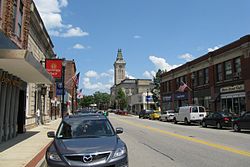Marlborough, MA
| Marlborough, Massachusetts | ||
|---|---|---|
| City | ||

Main Street
|
||
|
||
 Location in Middlesex County in Massachusetts |
||
| Location in the United States | ||
| Coordinates: 42°20′45″N 71°33′10″W / 42.34583°N 71.55278°WCoordinates: 42°20′45″N 71°33′10″W / 42.34583°N 71.55278°W | ||
| Country | United States | |
| State | Massachusetts | |
| County | Middlesex | |
| Settled | 1657 | |
| Incorporated | 1660 | |
| Government | ||
| • Type | Mayor-council city | |
| • Mayor | Arthur G. Vigeant (R) | |
| Area | ||
| • Total | 22.2 sq mi (57.4 km2) | |
| • Land | 21.1 sq mi (54.6 km2) | |
| • Water | 1.1 sq mi (2.8 km2) | |
| Elevation | 450 ft (137 m) | |
| Population (2010) | ||
| • Total | 38,499 | |
| • Density | 1,804.0/sq mi (697.2/km2) | |
| Time zone | Eastern (UTC-5) | |
| • Summer (DST) | Eastern (UTC-4) | |
| ZIP code | 01752 | |
| Area code(s) | 508 / 774 | |
| FIPS code | 25-38715 | |
| GNIS feature ID | 0611360 | |
| Website | http://www.marlborough-ma.gov/ | |
Marlborough (often spelled Marlboro) is a city in Middlesex County, Massachusetts, United States. The population was 38,499 at the 2010 census. Marlborough became a prosperous industrial town in the 19th century and made the transition to high technology industry in the late 20th century after the construction of the Massachusetts Turnpike.
Marlborough was declared a town in 1660. It was incorporated as a city in 1890 when it changed its Municipal charter from a New England town meeting system to a Mayor–council government.
Christopher Allen was recorded as marshal of Marlborough in 1638 and married to Mary Wetherbee. John Howe, Jr. in 1656 was a fur trader and built a house at the intersection of two Indian trails, Nashua Trail and Connecticut path. He could speak the language of the Algonquian Indians though the local tribe referred to themselves as the Pennacooks. The settlers were welcomed by the Indians because they protected them from other tribes they were at war with. In the 1650s, several families left the nearby town of Sudbury, 18 miles west of Boston, to start a new town. The village was named after Marlborough, the market town in Wiltshire, England. It was first settled in 1657 by 14 men led by Edmund Rice, John Ruddock and John Howe; in 1656 Rice and his colleagues petitioned the Massachusetts General Court to create the town of Marlborough and it was officially incorporated in 1660. Rice was elected a selectman at Marlborough in 1657. Sumner Chilton Powell wrote, in Puritan Village: The Formation of a New England Town, "Not only did Rice become the largest individual landholder in Sudbury, but he represented his new town in the Massachusetts legislature for five years and devoted at least eleven of his last fifteen years to serving as selectman and judge of small causes."
...
Wikipedia


